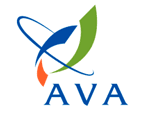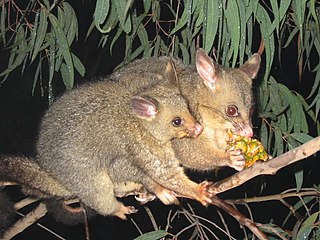Biosecurity refers to measures aimed at preventing the introduction and/or spread of harmful organisms intentionally or unintentionally outside their native range and/or within new environments. In agriculture, these measures are aimed at protecting food crops and livestock from pests, invasive species, and other organisms not conducive to the welfare of the human population. The term includes biological threats to people, including those from pandemic diseases and bioterrorism. The definition has sometimes been broadened to embrace other concepts, and it is used for different purposes in different contexts.

Mycobacterium bovis is a slow-growing aerobic bacterium and the causative agent of tuberculosis in cattle. It is related to Mycobacterium tuberculosis, the bacterium which causes tuberculosis in humans. M. bovis can jump the species barrier and cause tuberculosis-like infection in humans and other mammals.
The Australian Government Department of Agriculture and Water Resources was a government department that existed between 2015 and 2019, which was responsible for developing and implementing policies and programs that contribute to strengthening Australia's primary industries, delivering better returns for primary producers at the farm gate, protecting Australia from animal and plant pests and diseases, and improving the health of Australia's rivers and freshwater ecosystems.

A number of introduced species, some of which have become invasive species, have been added to New Zealand's native flora and fauna. Both deliberate and accidental introductions have been made from the time of the first human settlement, with several waves of Polynesian people at some time before the year 1300, followed by Europeans after 1769.
The Ministry of Agriculture and Forestry was a state sector organisation of New Zealand which dealt with matters relating to agriculture, forestry and biosecurity. It was commonly known by its acronym, "MAF".
AsureQuality Limited is a State-Owned Enterprise (SOE) fully owned by the government of New Zealand. The company's core business is food quality assurance with its services including certification, inspection, testing, and training. AsureQuality has over 1700 staff at over 100 locations throughout New Zealand. AsureQuality also has a joint venture partner, Bureau Veritas.. Bureau Veritas and AsureQuality have two joint ventures, BVAQ Australia and BVAQ SouthEast Asia.

The Agri-Food and Veterinary Authority of Singapore (AVA) was a statutory board under the Ministry of National Development that regulated food safety, safeguarded animal and plant health, and facilitated the agri-food and fisheries trade sectors. AVA was disbanded on 1 April 2019, with duties being transferred to other statutory boards, Singapore Food Agency, National Environment Agency, Health Sciences Authority, and National Parks Board.

1080, the brand name given to the synthetic form of sodium fluoroacetate, is used in New Zealand in efforts to control populations of possums, rats, stoat and rabbits, which are invasive species in the New Zealand environment. Although the Parliamentary Commissioner for the Environment deemed the use of 1080 in New Zealand "effective and safe" in a 2011 re-evaluation and the substance is widely considered to be the most effective tool currently available for controlling possums over large areas, it remains a contentious issue, with the majority of the debate occurring between conservationists and livestock farmers on one side and hunters and animal-rights activists on the other.
There is a high use of pesticides in New Zealand due predominantly to the large agricultural industry.

In New Zealand, agriculture is the largest sector of the tradable economy. The country exported NZ$46.4 billion worth of agricultural products in the 12 months to June 2019, 79.6% of the country's total exported goods. The agriculture, forestry and fisheries sector directly contributed $12.653 billion of the national GDP in the 12 months to September 2020, and employed 143,000 people, 5.9% of New Zealand's workforce, as of the 2018 census.

The common brushtail possum was introduced from Australia to New Zealand, where it has become invasive and a major agricultural and conservation pest.

Dairy farming in New Zealand began during the early days of colonisation by Europeans. The New Zealand dairy industry is based almost exclusively on cattle, with a population of 4.92 million milking cows in the 2019–20 season. The income from dairy farming is now a major part of the New Zealand economy, becoming an NZ$13.4 billion industry by 2017.
Biosecurity in New Zealand guards against threats to agriculture and biodiversity, with strict border control measures being taken to prevent unwanted organisms from entering the country. New Zealand is an island nation that is geographically isolated from any other significant landmass. The species that are present evolved in the absence of organisms from elsewhere and display a high degree of endemism. Notable is the lack of land-based mammals, except for two species of bat. Indigenous species are at risk from population decline or extinction if any invasive species are introduced. The Ministry for Primary Industries (MPI) is the government department in charge of overseeing New Zealand's biosecurity. The Biosecurity Act 1993, which was a world first for biosecurity control, was passed to "restate and reform the law relating to the exclusion, eradication, and effective management of pests and unwanted organisms".
National biosecurity in Australia is governed and administered by two federal government departments, the Department of Health and the Department of Agriculture, Fisheries and Forestry. The Biosecurity Act 2015 (C'wealth) and related legislation is administered by the two departments and manages biosecurity risks at the national border. The Act aims to manage biosecurity risks to human health, agriculture, native flora and fauna and the environment. It also covers Australia's international rights and obligations, and lists specific diseases which are contagious and capable of causing severe harm to human health. Each state and territory has additional legislation and protocols to cover biosecurity in their jurisdiction (post-border) including the detection of pests and diseases that have breached the national border.
The Department of Agriculture and Fisheries is a department of the Queensland Government which aims to maximise the economic potential for Queensland's primary industries on a sustainable basis through strategic industrial development. The section known as Biosecurity Queensland is responsible for biosecurity matters within the state.

Badger culling in the United Kingdom is permitted under licence, within a set area and timescale, as a way to reduce badger numbers in the hope of controlling the spread of bovine tuberculosis (bTB). Humans can catch bTB, but public health control measures, including milk pasteurisation and the BCG vaccine, mean it is not a significant risk to human health. The disease affects cattle and other farm animals, some species of wildlife including badgers and deer, and some domestic pets such as cats. Geographically, bTB has spread from isolated pockets in the late 1980s to cover large areas of the west and south-west of England and Wales in the 2010s. Some people believe this correlates with the lack of badger control.
Cats are a popular pet in New Zealand. Cat ownership is occasionally raised as a controversial conservation issue due to the predation of endangered species, such as birds and lizards, by feral cats.

Animal welfare in New Zealand is governed by the Animal Welfare Act 1999 and a number of organisations actively advocate for both animal welfare and animal rights. Pest control and farming practices have been scrutinised with respect to animal welfare issues. The legality of killing dogs and cats for consumption has also been criticized.

The Department of Agriculture, Fisheries and Forestry (DAFF) was an Australian government department that existed between 1998 and 2013, when it was renamed as the Department of Agriculture. DAFF's role was to develop and implement policies and programs that ensure Australia's agricultural, fisheries, food and forestry industries remained competitive, profitable and sustainable.

The Australian Department of Agriculture was an Australian Government department in existence between May 2019 and February 2020, which was responsible for developing and implementing policies and programmes that contribute to strengthening Australia's primary industries, delivering better returns for primary producers at the farm gate, protecting Australia from animal and plant pests and diseases, and improving the health of Australia's rivers and freshwater ecosystems.










